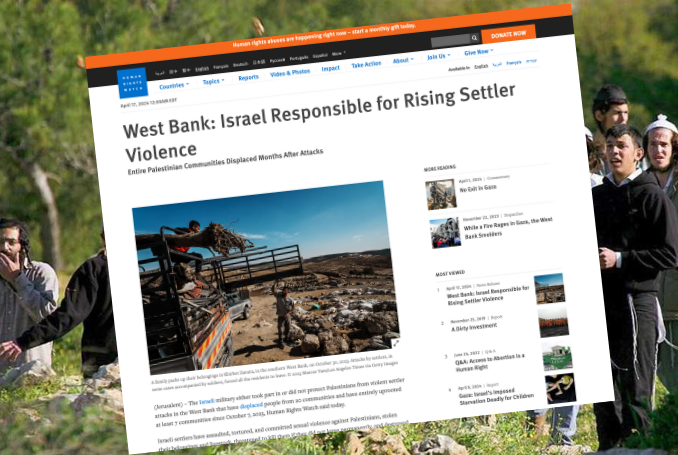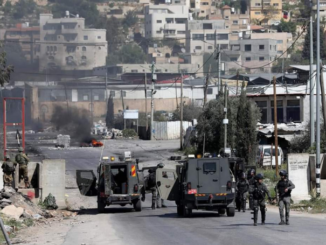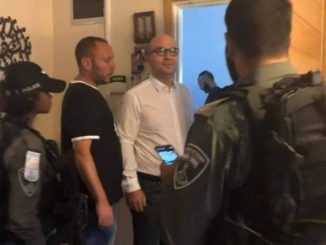
“While the attention of the world is focused on Gaza, abuses in the West Bank, fueled by decades of impunity and complacency among Israel’s allies, are soaring.”
Violent settler attacks in the West Bank have displaced people from 20 communities and uprooted at least seven communities since October 7, Human Rights Watch (HRW) has said, adding that the Israeli military either participated in those attacks or did not protect Palestinians from it.
“Settlers and soldiers have displaced entire Palestinian communities, destroying every home, with the apparent backing of higher Israeli authorities,” said Bill Van Esveld, associate children’s rights director at HRW in a report on Wednesday. “While the attention of the world is focused on Gaza, abuses in the West Bank, fueled by decades of impunity and complacency among Israel’s allies, are soaring.”
The NGO investigated attacks that forcibly displaced all residents of Khirbet Zanuta and Khirbet al-Ratheem south of Hebron (Al-Khalil), al-Qanub east of Hebron, and Ein al-Rashash and Wadi al-Seeq, east of Ramallah, in October and November 2023.
HRW said, “The evidence shows that armed settlers, with the active participation of army units, repeatedly cut off road access and raided Palestinian communities, detained, assaulted, and tortured residents, chased them out of their homes and off their lands at gunpoint or coerced them to leave with death threats, and blocked them from taking their belongings.”
Armed by Israel
Following October 7, the report explained, the Israeli military “called up 5,500 settlers who are Israeli army reservists, including some with criminal records of violence against Palestinians, and assigned them to West Bank ‘regional defense’ battalions.”
Israeli authorities distributed 7,000 guns to battalion members and others, including “civilian security squads” established in settlements, according to Haaretz, and Israeli rights groups, the report added.
There were also media reports that settlers left leaflets and sent threats on social media to Palestinians after October 7, such as warnings to “flee to Jordan” or be “exterminate[d],” and that “the day of revenge is coming.”
“Israeli authorities are ultimately responsible for settler violence against Palestinians in the #WestBank. The international community has tools available to try to pressure Israel to rein in the violence.”
? Listen to @astroehlein’s Daily Brief: https://t.co/OI2H28I2JS pic.twitter.com/1PUh3hihfE
— Human Rights Watch (@hrw) April 17, 2024
‘Cut Our Throats’
HRW spoke to 27 witnesses of the attacks and viewed videos that residents filmed, showing harassment by men in Israeli military uniforms carrying M16 assault rifles.
Among the testimonies included in the report, is that of the Jewish settler attacks which forced residents of al-Qanub to flee on the evening of October 9.
Since then, the “community of about 40 people have been unable to return,” the report said.
One resident, named Salim, told HRW that armed settlers ordered them to leave within an hour or they would be killed, and one man said he would “cut our throats, and pointed at us, including our kids.”
Salim said the settlers, accompanied by dogs, stole about 200 sheep that belonged to him and his father and led them toward a settlement outpost.
He and several neighbours ran after them, but “that seemed to trigger” the settlers. Fearing that they would be shot, Salim’s father told the residents to leave.
“I told my wife to take the kids and run,” Salim said.
Human Rights Watch also interviewed members of families who fled Khirbet Zanuta, in the southern West Bank, on November 1 due to settler attacks. The entire community of more than 140 people was displaced.
On January 31, rights activists filmed settlers fencing off Khirbet Zanuta’s lands, the report said.
بعد هجمات متكررة من مستوطنين إسرائيليين على سكان خربة زانوتا، جنوب الخليل في الضفة الغربية المحتلة، أمر المستوطنون أهالي الخربة بإخلاء أراضيهم عقب تهديدهم بالقتل في أكتوبر الماضي، ورصد نشطاء في نهاية يناير مستوطنين يحوّطون المنطقة المهجورة بسور. زار «مدى مصر» أحد نازحي خربة… pic.twitter.com/f83ylGfQDG
— Mada Masr مدى مصر (@MadaMasr) February 5, 2024
Acres Stolen
HRW further said that an Israeli human rights organization, Haqel: In Defense of Human Rights, petitioned the Israeli High Court to instruct the army to protect and allow six displaced communities to return, including Khirbet Zanuta.
However, “the Israeli state attorney’s February 20 response claimed that no forced displacement occurred and that Palestinians had left voluntarily due to herding and agricultural problems, according to Haqel.”
The next hearing in the case is scheduled for May 1.
The displaced residents raised sheep, that settlers had stolen “and fodder that families had bought on credit and now cannot repay. Other families escaped with their flocks but had to build new shelters and have nowhere to graze them.”
The Israeli rights group B’Tselem reported that as of mid-March, settlers had taken over 4,000 dunams (about 988 acres) of Palestinian grazing lands since October 7, HRW said.
Over 700 Attacks
The report stated that the UN has recorded more than 700 settler attacks between October 7 and April 3, with soldiers in uniform present in nearly half of the attacks.
A father from Douma, South Nablus – West Bank describes the terror of being unable to protect his family and his little children during a violent attack by settlers.
He expresses the profound helplessness felt as hundreds of settlers attempted to set his house ablaze with his… pic.twitter.com/OtZ1Y4ouMO
— Robert Martin ?? (@Robert_Martin72) April 16, 2024
Attacks since October 7 have displaced over 1,200 people, including 600 children, from rural herding communities. At least 17 Palestinians were killed and 400 wounded, while Palestinians have killed 7 settlers in the West Bank since October 7, the UN reported, according to HRW.
None of those evicted from the five communities investigated have been able to return, the organization found.
The Israeli military “either rejected or did not answer requests to allow residents to return, leaving Palestinians without protection from the same armed settlers and soldiers who threatened to kill them if they returned.”
One family with seven children, forced to flee on foot from al-Qanub, now lived in a small cinderblock storeroom with no money to pay the rent, HRW said.
“Forcible transfer or deportation and the extensive destruction and appropriation of property in occupied territory are war crimes,” the report said.
It further said that the “Israeli authorities’ systematic oppression of and inhumane acts against Palestinians, including war crimes, committed with the intent to maintain the domination of Jewish Israelis over Palestinians, amount to the crimes against humanity of apartheid and persecution.”
International Complicity
HRW urged governments to “suspend military support to Israel, given the risk of complicity in abuses.”
They should also “review and possibly suspend bilateral agreements, such as the EU-Israel Association Agreement, and ban trade with settlements in the occupied territories.”
The UK should “immediately withdraw the Economic Activity of Public Bodies (Overseas Matters) Bill, which restricts public bodies in the UK from deciding not to do business with companies operating in illegal Israeli settlements in the West Bank.”
Israeli settlers trespass and attack Palestinian lands and tents in the village of Susiya, located in southern occupied Hebron in the West Bank. pic.twitter.com/6sfSvCV411
— Quds News Network (@QudsNen) April 15, 2024
Sanctions Urged
HRW also said the US, EU, UK and other countries “consider sanctions on those responsible for ongoing Israeli attacks on Palestinian communities or for the prevention of displaced Palestinians from returning to their lands, until those subject to sanctions end the attacks and ensure the displaced Palestinians can return.”
“Palestinian children have seen their families brutalized, and their homes and schools destroyed, and the Israeli authorities are ultimately to blame,” Van Esveld said. “Senior state officials are fueling or failing to prevent these attacks, and Israel’s allies are not doing enough to stop that.”
HRW said that as of April 16, the Israeli military did not reply to questions that the organization sent by email on April 7.
(The Palestine Chronicle)








